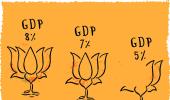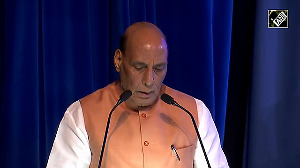'Such measures can trigger a virtuous cycle for corporate profitability, which would improve the capital markets, as well as improve corporate balance-sheets and lead to a revival of capex cycle in due course.'
'These announcements can have a far-reaching impact in lifting the weak market sentiment.'
'After these announcements, we should see increased participation from overseas investors, who were underweight on India.'
Illustration: Uttam Ghosh/Rediff.com

The record single-day gains posted by the markets following the slew of tax cuts announced by Finance Minister Nirmala Sitharaman have made market participants hopeful of a sustainable rally.
In an interaction with Jash Kriplani, A Balasubramanian, managing director and chief executive officer, Aditya Birla Sun Life Asset Management Company, shares his optimism on what makes him believe that these cuts can help in addressing multiple issues plaguing the economy, without letting fiscal deficit pose any major risk. Edited excerpts:
What was your reading of the finance minister's policy decisions?
It came as a big positive surprise.
Some market participants felt that the announcements made so far were piecemeal and not concrete.
However, all the announcements made recently were concrete, well-focused and tactically placed to address multiple issues.
Along with cutting corporation tax to 25 per cent, the finance minister announced softer tax rates for new manufacturing companies.
For the latter, the tax rate was reduced to 15 per cent plus a surcharge.
After including the revised rates for minimum alternate tax, the tax rate for corporates will not go beyond 20 per cent.
So, tax cuts were announced across the board.
Such measures can trigger a virtuous cycle for corporate profitability, which would improve the capital markets, as well as improve corporate balance-sheets and lead to a revival of capex cycle in due course.
These announcements can have a far-reaching impact in lifting the weak market sentiment.
When do you see capex cycle reviving?
It will take some time as first, consumer demand needs to improve.
 The good monsoon should help improve rural income.
The good monsoon should help improve rural income.
There should also be some marginal increase in minimum support prices of some of the crops.
All this should bode well for consumption demand.
Once demand is back, capex should pick-up.
The government is already making it easier for corporates to make fresh investments.
Lower tax rates for new manufacturing companies are aimed at stimulating the manufacturing activity, which will also improve employment levels.
If capital markets remain strong in light of the tax cut-led earnings boost, it will allow corporates to access lower cost of capital through equity fundraising.
This can be used for further expansion activities.
Clarifying that buybacks launched before July 5 (the Budget day) will be exempted from buyback tax will also put corporates at ease.
How do you see tax cuts impacting fiscal deficit?
There could be some shortfall.
The government is estimating the shortfall to be around Rs 1.4 trillion.
However, the deficit is not the bigger concern, it is the ability to raise more resources.
Even if there is a hit this year as a result of these tax cuts, the impact will get mitigated as the Reserve Bank of India (RBI) is transferring Rs 1.7 trillion to the government as part of the Bimal Jalan committee's recommendations.
How do you see fiscal slippage playing out in the bond markets?
We can see the 10-year bond yields inching up again to 7 per cent.
However, the RBI is expected to continue with its bias towards lowering rates as inflation has largely been under control.
The central bank is likely to keep its focus on supporting the growth trajectory.
Due to the marginal slippage on the fiscal side, the 10-year bond yield could hover around 6.75 per cent for some more time.
Following these moves, the government may also look at strategic stake sales in public sector units more aggressively, which would help keep the deficit under check.
Also, part of government borrowing can move to overseas markets.
So, rates are likely to get managed efficiently, which would limit the overall impact on the bond markets.
At the same time, we can also see credit spreads contracting as confidence comes back to the lending market.
Once fears in the credit market abate, the spreads are likely to contract at a faster pace, which would give some of the troubled sectors, such as auto, access to lower cost of financing.
But, can we see credit market concerns continue to weigh on market sentiments?
On the contrary, we should start seeing the next set of improvements in the credit markets.
Resolution processes related to some of the stressed accounts are well on track.
All regulators have come together with the aim of fast-tracking the resolution process.
As credit-related fears continue to ease, it won't be surprising to see the Nifty at 12,000-levels in the next few months.
The improvement in the debt markets will give further confidence to market participants.
What will be the key monitorables from the markets' point of view?
It would be important to see how top-line growth shapes up for India Inc.
The tax cuts have given an immediate lift to earnings growth.
So, analysts will be discounting earnings growth, while making their quarterly estimates.
Good monsoons should improve rural consumption, which will help top-line growth.
This will also be positive for mid- and small-cap companies as quite a few companies in this segment are generating profits, but are not seeing meaningful growth.
Once top-line growth catches up, the valuations would start to look quite attractive.
What are the chances of Friday's (September 20) record gains turning into a sustained market rally?
The markets had been under pressure as a lot of short-sellers had built positions.
A significant portion of these positions was built by overseas hedge funds.
So, any upmove was getting sold into and even a small negative trigger was leading to sharp volatility.
Going ahead, short-selling is likely to reduce as the sharp surge in the markets on Friday led to huge losses on most of these positions.
These announcements have reversed all the perception issues pertaining to the government's ability to take decisive action.
After these announcements, we should see increased participation from overseas investors, who were underweight on India.













 © 2025
© 2025